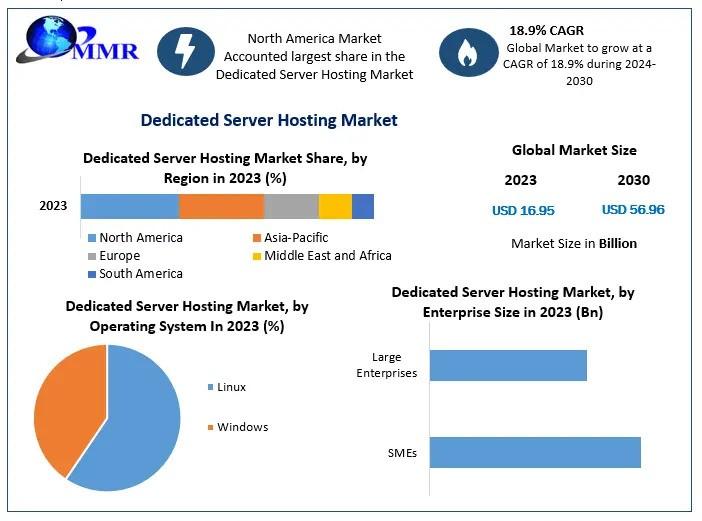As businesses churn more data than ever before—and with no end in sight—their storage needs are evolving, creating a demand for high-capacity solutions that are fast, affordable, secure, and scalable. While both cloud servers and dedicated servers, whether on-premise or in data centers, meet many of those needs, each approach has different strengths and weaknesses that make it better-suited for some enterprises and applications than others. This article compares the two on features, performance, and cost to help you decide which might be the right fit for your own organization.
Cloud Servers vs. Dedicated Servers: Comparison Chart
The following chart highlights the criteria detailed in this article to summarize the differences between cloud servers and dedicated servers.
| Features | Cloud Server | Dedicated Server |
|---|---|---|
| Scalability | • Flexible scalability • Can adjust as traffic spikes |
• No auto scalability • System must be taken offline to scale up |
| Tenancy | • Multi-tenancy server sharing | • Single tenancy • Sustained high performance even under load |
| Price structure | • Pay-as-you-go model • No hardware costs • No costs of real estate or upkeep |
• High initial costs • Often must pay for unused resources |
| Starting plans | • Affordable plans to get businesses started | • High upfront costs • Categorized as a capital cost, can be spread over time |
| Redundancy | • Automated redundancy • Shifts to different component upon failure |
• Hardware redundancy • Requires teams to deploy failover mechanisms, and backup solutions • Increased chance of downtime |
| Deployments | • Near instant server deployments | • Longer deployments due to hardware setup |
| Security | • Compromises on security | • High security • High privacy |
| Migration | • Quick and easy migration | • Slower migration • Takes time and planning to minimize downtime |
| Status of FTE involved | • None–provider handles all personnel needs | • Technical skillset or resources required |
| Maintenance | • None—provider handles all maintenance | • Maintenance and upgrades needs skilled staff and plan for downtime |
| Customization | • Limited hardware customization available | • Highly customizable • Provides control over specific hardware components including CPUs, RAM, and storage |
Jump to:
What is a Cloud Server?
A cloud server is a virtual server running in a cloud computing environment. It’s endlessly scalable—unlimited users can access it as needed. Cloud servers are hosted by third-party vendors who lease them to customers.
A cloud server provides similar functionality to a physical server—it can store data and run applications—but it relies on a tool called a hypervisor to spread the resources of a physical server into many virtual machines that users access over the internet. Unlike physical servers, which are typically on-premises solutions that can only be accessed by on-site users, virtual cloud servers can be located anywhere.
Multiple linked cloud servers can share processing power and memory, making them more powerful than physical servers limited by the capabilities of their hardware. This makes them a good fit for a wide range of applications, including Infrastructure as a Service (IaaS), Software as a Service (SaaS), and Platform as a Service (PaaS) offerings. From the customer standpoint, they can be managed on the fly without much technical expertise, and are generally the preferred options for startups and websites with controlled traffic.
They also offer built-in redundancy and high availability, which adds another layer of safety to data. The biggest downside for cloud servers is multi-tenancy—the vendor likely leases virtual machines sharing the same physical server to other customers. However, that doesn’t necessarily translate into security or privacy risks. Good providers use isolation and added encryption layers to minimize risks .
Cloud Server Highlights
- On-demand resources
- Up and down scalability options depending on the traffic
- No maintenance
- Instant upgrades
- Pay per usage
- Economical compared to traditional server models
- Technical expertise is not necessary
What is a Dedicated Server?
Dedicated servers refers to a physical server made up of hardware, software, and cables used to provide storage and processing capacity to a single business. They are typically hosted on-premises or in a data center. Because they are single-tenant servers, dedicated to one business, they are generally considered to be more secure with lower risk of breaches as long as proper cybersecurity measures are in place.
Dedicated servers’ capacity and performance is limited by their hardware. They are scalable, but adding capacity or boosting speed means an additional investment and possible downtime. They’re also expensive to build out initially, requiring up-front costs—and once the hardware is in place, even if requirements are reduced the business may still have to pay to keep the unused resources up and running.
In addition, maintaining on-premises dedicated servers typically requires skilled staff that can perform maintenance and upgrades and keep the system running at optimal levels. Because of the cost and the personnel requirements, dedicated servers are mostly used by large organizations that have a huge user base and need the additional security they offer over cloud solutions.
Dedicated Server Highlights
- Built to cater to specific needs
- Better security than cloud server
- Limited resources
- No automatic scaling options
- Maintenance and upgrade needs proper planning
- High initial investment
- Require technical personnel
Read What is a Hyperscale Data Center? to learn about other large-scale enterprise storage solutions.
Cloud Server vs. Dedicated Server: The Right Server Solution For Your Needs
Which type of server your organization decides upon comes down to the specific needs of your business. Here’s a look at how they compare on the most essential criteria.
Performance
Winner: Dedicated Servers
A properly resourced dedicated server beats a cloud server for performance. Single tenancy ensures that your resources have no other shared owner, meaning no rundown in performance. Although cloud servers do not provide the same level, they still offer good performance—but the lack of personalization for use-cases means you get a general cloud server, while a physical server can be built to spec.
Of course, there are mitigating factors. Building and maintaining physical servers requires investment, personnel, and upkeep. Cloud servers are more affordable, instantly available, and maintenance free—plus they offer additional benefits like high availability and automated redundancy so your data is protected even in the face of hardware failure.
Upgrades and Maintenance
Winner: Cloud Servers
Dedicated servers are high maintenance. They require careful and meticulous planning and constant upkeep. Upgrades and repairs can lead to downtime. Technical expertise is also required. With cloud servers, the vendor handles all of that behind the scenes so users get a seamless experience with easy handling, repair, and maintenance, instant upgrades, and minimal downtime.
Security and Privacy
Tie
Dedicated servers are typically more privacy-oriented because they are single tenant solutions in a physical location that can be monitored and controlled. Breaches are possible, but avenues for them are limited and resolution is usually fast. Cloud servers are accessible virtually, making them theoretically more vulnerable to threats—and since users share servers with unknown tenants, privacy issues are possible.
But cloud vendors put a lot of time, money, and effort into security, and protecting data is a shared responsibility—in the event of a breach, their reputation is on the line along with your organization’s. Many cloud servers now come up with in-built data encryption, firewalls, cloud monitoring, and backup services, boosting confidence in their ability to keep data secure.
Budget
Winner: Cloud Servers
A general guideline is that cloud servers cost about one-quarter the cost of physical servers on a monthly basis, exclusive of costs incurred meeting compliance requirements or allocating personnel resources. They’re more affordable out of the gate, making them a better choice for small businesses that have to justify the value of every dollar spent on data management or hosting or companies that need to get up and running quickly and don’t have time, capital investment funds, or physical real estate to build out a server room or data center.
Dedicated servers cannot match the pay-as-you-go model of cloud servers—and businesses only pay for the resources they use. If your demand drops, you can scale down your plan and lower your expenses. They’re also usually considered an operational expenditure, as they involve either a pay per hour or monthly billing model. But dedicated servers require high upfront capital costs, with a dedicated monthly expenditure in terms of maintenance.
Cloud Servers vs. Dedicated Servers: Use Cases
While budget and performance are essential criteria for deciding which solution is right for your business, in some situations the use case will better determine the fit.
Dedicated servers are a better fit for the following use cases:
- High-traffic websites that experience only occasional dips—the always-available processing power ensures the business is always up and running at full speed.
- e-Commerce platforms, SaaS providers, FinTech, and media streaming organizations—these types of businesses generally rely on dedicated servers to provide the high-capacity, high-performance data management and hosting they require.
Cloud servers are a better fit in other cases, including:
- Websites with planned traffic—sites that peak at scheduled or infrequent times, such as Christmas sales or Black Friday discounts, may not need the constant performance of dedicated servers.
- Data loss prevention and backup solutions—cloud servers eliminate the risk of data loss due to hardware failure and are configurable and auto scalable.
- SaaS, IaaS, and PaaS solutions—capacity, performance, and their ability to serve unlimited users makes them an ideal fit for these applications.
Bottom Line: Cloud Server vs Dedicated Server
The right server can be a game-changer in how businesses deliver products, host applications, manage data environments, and build expansive customer experiences. Dedicated servers have been a traditional favorite, while cloud servers too have been gaining acceptance as businesses see their potential, ease of use, and cost effectiveness. Their popularity also increased dramatically during the pandemic, when many businesses were forced to find off-premises solutions for their workforce.
Ultimately, the choice between dedicated, and cloud servers boils down to a business’ specific needs, budget, and priorities. Cloud servers offer scalability, come with zero resource burden, and have an unwavering availability. But dedicated servers bring raw power, complete control, and rock-solid security to the table, making them ideal for enterprises with stable resource requirements or stringent compliance needs. The right solution is the one that aligns with your business goals, ensuring optimal performance and reliability.
To learn more about multi-tenant enterprise solutions, read Hyperscale Data Centers vs. Colocation Data Centers next.
https://www.enterprisestorageforum.com/cloud/cloud-vs-dedicated-servers/






